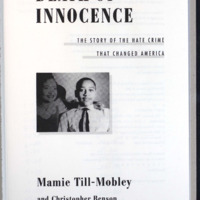-
Title
-
Death of innocence: the story of the hate crime that changed America
-
Description
-
Mamie Carthan was an ordinary African-American woman growing up in 1930s Chicago, living under the strong steady influence of her mother's care. She fell in love with and married Louis Till, and while the marriage didn't last, they did have a beautiful baby boy, Emmett. "In August 1955, Emmett was visiting family in Mississippi when he was kidnapped from his bed in the middle of the night by two white men and brutally murdered. His crime: allegedly whistling at a white woman in a convenience story. His mother began a career of activism when she insisted on an open-casket viewing of her son's gruesomely disfigured body. More than a hundred thousand people attended the service. The trial of J. W. Milam and Roy Bryant, accused of kidnapping and murdering Emmett (the two were eventually acquitted of the crime), was considered the first full-scale media event of the civil rights movement." "What followed altered the course of this country's history, and it was all set in motion by the sheer will, determination, and courage of Mamie Till-Mobley - a woman who would pull herself back from the brink of suicide to become a teacher and inspire hundreds of black children throughout the country."--BOOK JACKET.
-
Identifier
-
1139423
-
1400061172
-
Creator
-
Till-Mobley, Mamie
-
Format
-
1st ed.
-
Contributor
-
Benson, Chris
-
Source
-
Brian Lamb Booknotes Collection
-
Gift of Brian Lamb, 2011.
-
Catalog record
-
Language
-
eng
-
Date
-
2003
-
Program air date: April 25, 2004
-
Publisher
-
Random House
-
George Mason University. Libraries. Special Collections & Archives
-
Text
-
Transcription of Annotations
Extensive notes on front papers concerning the murder of Emmett Till and its aftermath, the trial of the men who murdered Emmett Till, the racism experienced by African-Americans in Mississippi during the 1950's, Mamie Till Mobley's life and activism after the trial, artistic expressions influenced by the murder. Examples of notes include: "the code, you couldn't show emotions," "Willie Reed, 18 - agreed to cooperate," "Carolyn Bryant's testimony," "reopen the investigation," "not a single black person registered to vote," "many people were there to talk to me," and "they admitted their guilt." Annotations by Brian Lamb in the margins and underlining of pertinent phrases throughout the book. Examples include: "I agree to let Emmett go," "missed him," "his father's ring," "a few versions of what happened," "role of media TV," "I collapsed," "Mamie dies at 79," "Rosa Parks," "Emmett Till Road," "reopen investigation," and "against death penalty." Autograph and note to Brian Lamb by co-author Christopher Benson dated 2 March 2004.
-
Subject
-
"Till, Emmett, 1941-1955--Death and burial."
-
"Lynching--Mississippi."
-
"Hate crimes--Mississippi."
-
"African American youth--Crimes against--Mississippi."
-
"Racism--Mississippi."
-
"Trials (Murder)--Mississippi."
-
Relation
-
Original Booknotes interview
-
Rights
-
This work may be protected by copyright laws and is provided for educational and research purposes only. Any infringing use may be subject to disciplinary action and/or civil or criminal liability as provided by law. If you believe that you are the rights-holder and object to Mason’s use of this image, please contact speccoll@gmu.edu.
 1139423.pdf
1139423.pdf